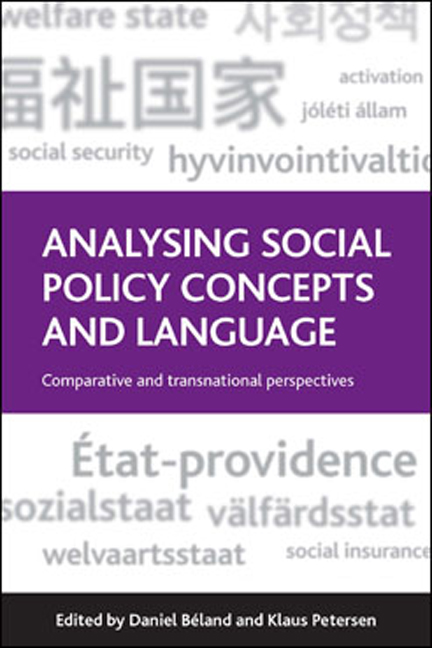Book contents
- Frontmatter
- Contents
- List of figures and tables
- Acknowledgement
- Notes on contributors
- Introduction: social policy concepts and language
- one Social policy language in Denmark and Sweden
- two The changing language of social policy in Hungary and Polan
- three Languages of ‘social policy’ at ‘the EU level’
- four The OECD's search for a new social policy language: from welfare state to active society
- five The discursive power of international organisations: social policy language and concepts in the World Bank and the International Monetary Fund
- six Original and imitated or elusive and limited? Towards a genealogy of the welfare state idea in Britain
- seven Social policy concepts and language in France
- eight The language of social politics in Finland
- nine Germany: constructing the ‘win-win’ society
- ten Conceptual development of welfare and social policy in Japan
- eleven Transition to the ‘universal’ welfare state: the changing meaning of ‘welfare state’ in Korea
- twelve The Dutch ‘caring state’
- thirteen Panacea, problem or perish: social policy language in New Zealand
- fourteen Evolving social policy languages in Spain: what did democracy and EU membership change?
- fifteen Social policy language in the United States
- Conclusion: comparative perspectives on social policy language
- Index
four - The OECD's search for a new social policy language: from welfare state to active society
Published online by Cambridge University Press: 04 March 2022
- Frontmatter
- Contents
- List of figures and tables
- Acknowledgement
- Notes on contributors
- Introduction: social policy concepts and language
- one Social policy language in Denmark and Sweden
- two The changing language of social policy in Hungary and Polan
- three Languages of ‘social policy’ at ‘the EU level’
- four The OECD's search for a new social policy language: from welfare state to active society
- five The discursive power of international organisations: social policy language and concepts in the World Bank and the International Monetary Fund
- six Original and imitated or elusive and limited? Towards a genealogy of the welfare state idea in Britain
- seven Social policy concepts and language in France
- eight The language of social politics in Finland
- nine Germany: constructing the ‘win-win’ society
- ten Conceptual development of welfare and social policy in Japan
- eleven Transition to the ‘universal’ welfare state: the changing meaning of ‘welfare state’ in Korea
- twelve The Dutch ‘caring state’
- thirteen Panacea, problem or perish: social policy language in New Zealand
- fourteen Evolving social policy languages in Spain: what did democracy and EU membership change?
- fifteen Social policy language in the United States
- Conclusion: comparative perspectives on social policy language
- Index
Summary
The International Labour Organisation (ILO) was the first international organisation with an explicit social mandate, but by the 1960s it had been joined by a plethora of UN related and other international organisations, including the Organisation for Economic Co-operation and Development (OECD). Although the OECD's primary mission was to promote economic cooperation among advanced capitalist economies, it has also become an important node in transnational social policy networks, working alongside other key international organisations and in close cooperation with the European Commission. Some see the OECD as an important contributor to the neoliberal assault on the welfare state (Armingeon and Beyeler, 2004). Yet it – or, more precisely, its Directorate for Employment, Labour and Social Affairs (DELSA) – has also been seen as one of the early (1990s) promoters of the idea of ‘social investment’ as an alternative to the neoliberal conception of the welfare state as a barrier to the efficient operation of labour markets (Jenson, 2010).
These two views need not be at odds with one another: just as there were varied conceptions of the welfare state in the Keynesian era, so too is social investment understood in different ways (Mahon, 2010a). What this paper shows is that already in the twilight of the Keynesian era, the OECD had begun to talk about the need for a shift towards a more ‘positive’ and ‘preventive’ conception, while the two oil shocks and stagflation helped to open the way for the break with Keynesian ideas. By the end of the 1970s, the OECD was set to host the conference often seen as promoting the adoption of the ‘welfare state as burden’ language. It is argued here, however, that while the conference did stress the need to curb social expenditure, it also accelerated the search for a new conception of social policy, but it was not until the first meeting of social policy ministers (1988) that the new understanding got its name – ‘active society.’ Although the active society was initially translated into terms that fit with the organisation’s neoliberal Jobs Strategy,resistance to the Strategy within the Social Policy Directorate and among certain member states opened the way for a more equity oriented interpretation.
- Type
- Chapter
- Information
- Analysing Social Policy Concepts and LanguageComparative and Transnational Perspectives, pp. 81 - 100Publisher: Bristol University PressPrint publication year: 2014
- 1
- Cited by



